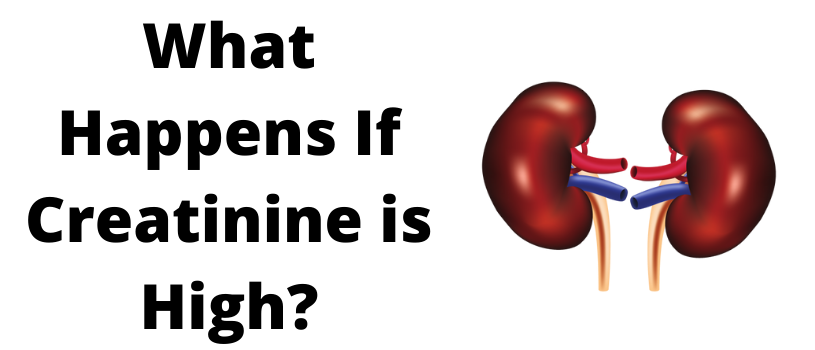What happens if your creatinine levels are too high?
The healthy kidneys keep blood creatinine in a normal range.The level of creatinine in the blood is a pretty accurate indication of kidney function. A high creatinine level in the blood indicates improper kidney functioning or that you might have kidney disease.The creatinine level will grow when the kidneys become impaired that leading to poor creatinine clearance by the kidneys. Calculating how much creatinine is removed from the body by the kidneys provides a more precise measure of renal function. This is known as creatinine clearance, and it measures the rate at which the kidneys filter waste,also called Glomerular filtration rate (GFR). There are two methods for determining creatinine clearance. It can be computed using a formula that takes into account the patient's weight, age, and blood creatinine level.
Collecting a 24-hour urine sample and then extracting a blood sample can also be used to determine creatinine clearance. The amounts of creatinine in the urine and blood are measured and compared. Healthy women have a creatinine clearance of 88-128 mL/min, whereas healthy men have a creatinine clearance of 97 to 137 mL/min (normal levels may vary slightly between labs).
Another sign of kidney function is the blood urea nitrogen (BUN) level. Urea is a metabolic waste product that can accumulate if renal function is compromised. When compared to the creatinine level alone, the BUN-to-creatinine ratio provides more accurate information on renal function and its likely underlying cause. Dehydration causes an increase in BUN.
If your kidneys are unable to fulfill the above-mentioned functions, you may have symptoms such as dry or itchy skin, a high creatinine level, a loss of appetite, weakness, and vomiting. This blog examines the health problems associated with high creatinine levels, the creatinine level that necessitates dialysis.
Ayurveda is an ancient form of medication, and creatinine treatment in Ayurveda can be really very helpful and effective.
What are the levels of creatinine in the blood that are considered normal?
Creatinine levels in the blood should be between 0.6 and 1.2 milligrams per deciliter (mg/dL) in adult males and 0.5 to 1.1 milligrams per deciliter (dL) in adult females.
What is a high creatinine level?
- A normal level for a person with a single kidney is between 1.8 and 1.9.
- Creatinine values of 2.0 or higher in newborns and 5.0 or higher in adults can indicate significant renal disease.
- The requirement for a dialysis machine to eliminate wastes from the blood is determined by a number of factors, including the BUN, creatinine level, potassium level, and the amount of fluid retained by the patient.
What are the signs and symptoms of having a high creatinine level?
Kidney dysfunction has a wide range of symptoms. They don't always correspond to blood creatinine levels.
- Some persons with no symptoms may have an inadvertent finding of severe renal disease and increased creatinine on regular blood tests.
- In others, depending on the nature of the disease, various kidney failure symptoms may be present, such as:
- If you're dehydrated
- Fatigue
- Inflammation (edema)
- A feeling of being out of breath
- Perplexity, or
- A slew of other symptoms like nausea, vomiting, dry skin, etc.
What causes raised (high) blood creatinine levels?
Creatinine levels in the blood are likely to rise in any disorder that compromises kidney function. It's critical to determine whether kidney dysfunction is a long-term or recent occurrence. Elevations that have occurred recently may be more easily treated and reversed.
In adults, the most prevalent causes of long-term (chronic) kidney disease are:
- High BP
- Diabetes
Other reasons for high blood creatinine levels include:
- Certain medicines, such as cimetidine, can occasionally cause excessively high creatinine levels.
- Serum creatinine might also increase transiently after consuming a substantial amount of dietary meat; as a result, nutrition can sometimes influence creatinine measurement.
- Kidney infections and urinary tract blockage can all cause an increase in creatinine.
Who has a low or high creatinine level in their blood?
- Young or middle-aged adults may have higher blood creatinine levels than the average population.
- Elderly people may have lower levels of creatinine in their blood than the general population. Depending on their muscle development, infants have normal amounts of approximately 0.2 or greater.
- Muscle mass tends to deteriorate over time in patients with malnutrition, substantial weight loss, and long-term diseases. Thus their creatinine level may be lower than expected for their age.
Ayurveda and Its effect on Creatinine level-
You may have symptoms such as dry or itchy skin, a high creatinine level, a loss of appetite, weakness, and vomiting if your kidneys are unable to perform the above-mentioned functions. For those with the health issues that come with high creatinine levels, the kind of creatinine that requires dialysis, Ayurveda can be very helpful. Ayurveda is an ancient kind of medicine, and it can be highly beneficial for creatinine treatment in Ayurveda.

Comments
Post a Comment